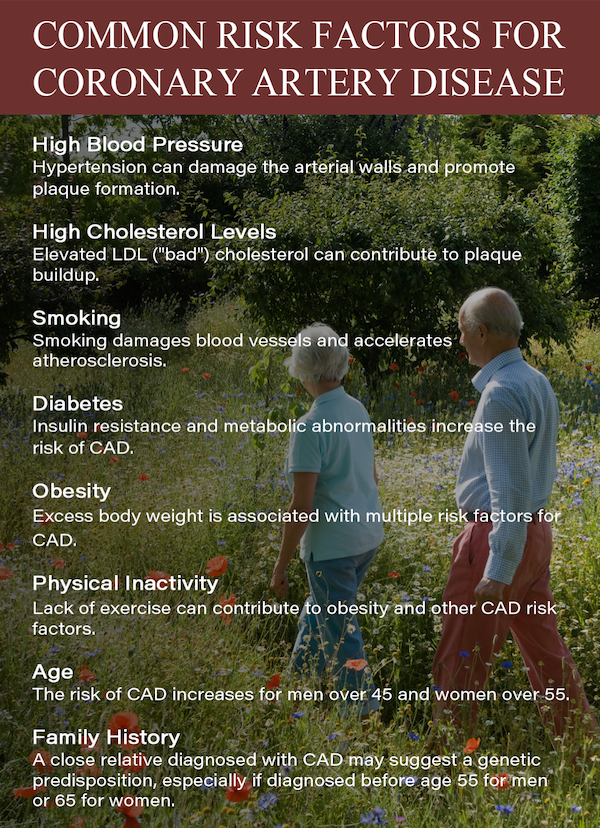
Written by Dr. Vamshi Gade
Every 33 seconds, someone in the United States dies of coronary artery disease (CAD). Also known as coronary heart disease or ischemic heart disease, CAD is the leading cause of death for American men and women. Characterized by the narrowing or blockage of the arteries that supply oxygen and nutrients to the heart, this often serious, yet all too common, cardiovascular condition leads to reduced blood flow to the heart muscle, resulting in a range of symptoms and potential complications, including heart attacks.
How does CAD develop?
The most common cause of CAD is atherosclerosis, a condition where cholesterol, calcium, and other substances build up on the inner walls of the coronary arteries. These deposits, known as plaques, can harden over time, narrowing the arteries and reducing blood flow. As the coronary arteries become progressively narrowed, the heart may not receive an adequate supply of blood and oxygen, which can lead to symptoms, especially during periods of increased demand, such as physical activity.
In some cases, a plaque in a coronary artery may rupture or develop a blood clot (thrombus) on its surface. This sudden blockage causes an acute event, such as a heart attack (myocardial infarction), which occurs when a portion of the heart muscle is deprived of oxygen and begins to die.
What are the symptoms of CAD?
Symptoms include chest pain, tightness, discomfort or pressure, known as angina. Pain may radiate to the arm, neck, jaw, or back. Other symptoms include shortness of breath, cold sweats, and nausea. If you’re experiencing any of these symptoms or unexplained fatigue, you should seek medical evaluation and potentially undergo CAD screening.
Who should be screened for CAD?
Screening for CAD can help identify the disease early, but may not be necessary for everyone. Whether to screen depends on your age, gender, overall health, and the risk factors listed in the chart below. You may also want to consider screening if you have chronic kidney disease or metabolic syndrome, or if you are overweight or have an unhealthy diet.

For most people, routine CAD screening is not necessary in the absence of specific risk factors or symptoms until they reach middle age or later. Men typically develop the disease at younger ages than women, and run a higher risk by age 45. A woman’s risk for CAD becomes greater after menopause.
In some cases, healthcare providers may recommend CAD screening for individuals without symptoms but with multiple risk factors. If you have a personal history of heart disease, heart attack, or other cardiovascular conditions, your healthcare provider may recommend regular monitoring and CAD screening. The decision will depend on your specific risk profile and the clinical judgment of your healthcare provider.
CAD screening can include blood tests to assess cholesterol levels, blood pressure measurement, and, in some cases, non-invasive imaging tests like stress tests or coronary computed tomography angiography (CTA). Invasive procedures like coronary angiography are typically reserved for individuals with significant risk factors or symptoms.
Ultimately, the decision to undergo CAD screening should involve consultation with your healthcare provider to assess the potential benefits and risks of screening. These discussions will help you make an informed decision based on your unique circumstances.
Lifestyle modifications play a crucial role in CAD prevention. Pause to consider if you need to adopt a heart-healthy diet, engage in regular physical activity, or quit smoking. You may need to work with your healthcare provider to manage risk factors like high blood pressure or diabetes. Always consult with your doctor to determine the most appropriate prevention strategies for your individual health needs.
If you suspect CAD might be an issue for you or a loved one, don’t wait until it’s too late. About 75 percent of all heart attacks in the United States are a first heart attack. Speak with your primary care physician about whether a referral to a cardiologist is warranted. With early diagnosis, appropriate medical care, and necessary lifestyle modifications, you can manage CAD, help prevent a heart attack, and improve your quality of life.
Dr. Vamshi Gade is a board-certified interventional cardiologist who specializes in cardiovascular disease and vascular medicine. A Fellow of the American College of Cardiology and Society of Cardiovascular Angiography and Interventions, Dr. Gade is fluent in English, Spanish and Telugu. He holds staff privileges at Saint Agnes Medical Center, Clovis Community Hospital, and Fresno Heart Hospital. To learn more about conditions of the heart, please visit theheartgroupfresno.com







